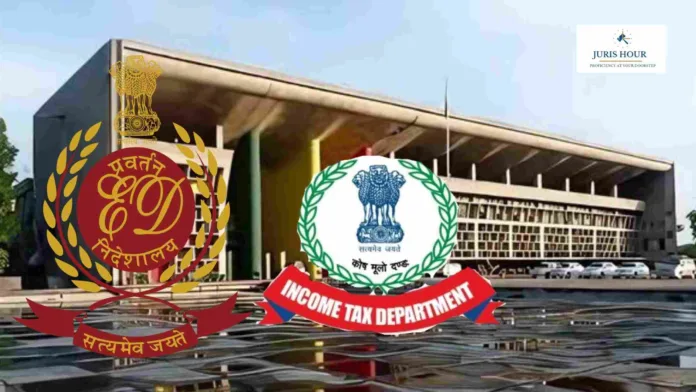The Punjab and Haryana High Court on Wednesday dismissed a set of petitions challenging orders that allowed the Enforcement Directorate (ED) to inspect documents filed by the Income Tax Department in connection with alleged undisclosed foreign assets.
The bench of Justice Tribhuvan Dahiya, while pronouncing the judgment, upheld the orders of a Ludhiana Magistrate and Additional Sessions Judge that granted the ED access to the judicial records for investigative purposes. The court clarified that while the ED could inspect the documents, their public dissemination would remain barred unless permitted by law.
The Income Tax Department had filed complaints against the petitioners under Section 277 of the Income Tax Act, 1961, along with several provisions of the Indian Penal Code. The allegations stem from information received from French authorities under the India-France Double Taxation Avoidance Convention (DTAC), which pointed to foreign assets, offshore trusts, and bank accounts in Switzerland linked to the petitioners.
During the proceedings, the ED sought permission to inspect the records, arguing that the matter also fell within its jurisdiction under the Foreign Exchange Management Act (FEMA), 1999. The Magistrate allowed the request in September 2020, which was later upheld by the Additional Sessions Judge in September 2021.
The petitioners argued that the records contained confidential information shared by France with India under Article 28 of the DTAC, which mandates secrecy and restricts disclosure to tax authorities. They contended that permitting the ED to inspect such documents would violate international obligations.
Relying on a Supreme Court judgment, counsel for the petitioners asserted that information provided by a foreign country for tax purposes could not be used indirectly for other proceedings.
Rejecting these arguments, Justice Dahiya referred to the Supreme Court’s ruling in Ram Jethmalani v. Union of India (2011), which held that provisions in tax treaties did not impose an absolute bar on disclosure of such information in judicial proceedings.
The court emphasized that:
- The ED, as a statutory investigating agency, had locus standi to inspect the records for sufficient reasons.
- The DTAC provisions only restricted public dissemination, not inter-departmental use for investigations.
- Any breach of treaty obligations could be raised by the Government of India, not by the petitioners themselves.
“The Enforcement Directorate is an independent investigation agency under FEMA. If inspection is not allowed, it would create hurdles in the investigation,” the court observed.
The High Court dismissed all three connected petitions and allowed the ED to inspect the records. However, it directed that the documents must not be made public unless authorized by law.
Case Details
Case Title: Amarinder Singh Versus Income Tax Dept.
Case No.: CRM-M-37200-2021
Date: 03.09.2025
Counsel For Petitioner: Gurmohan Singh Bedi, Advocate
Counsel For Respondent: Zoheb Hossain, Special Counsel
Read More: Delhi HC Declines to Release Seized Gold Bar, Directs Appeal Against Customs Confiscation

